Healthcare Ethics: Analyzing Hospital Policy on Influenza Immunization
VerifiedAdded on 2022/12/20
|8
|2016
|50
Report
AI Summary
This report analyzes the ethical implications of a hospital's mandatory influenza immunization policy for its healthcare staff, volunteers, and employees, as mandated by the CDC due to a predicted severe flu outbreak. The study identifies ethical conflicts, particularly concerning staff autonomy and self-determination, contrasting the policy with the principles of beneficence and non-maleficence. It references the ACHE Code of Ethics to assess the policy's adherence to professional standards, emphasizing the importance of integrity, fairness, and respect. The report evaluates the potential for adverse health effects from mandatory vaccination and considers the balance between protecting public health and safeguarding individual rights. Recommendations include providing education on the benefits of vaccination and informing employees about potential side effects. The conclusion underscores the significance of ethical principles in healthcare decision-making, advocating for an informed and balanced approach to immunization policies to improve health outcomes.
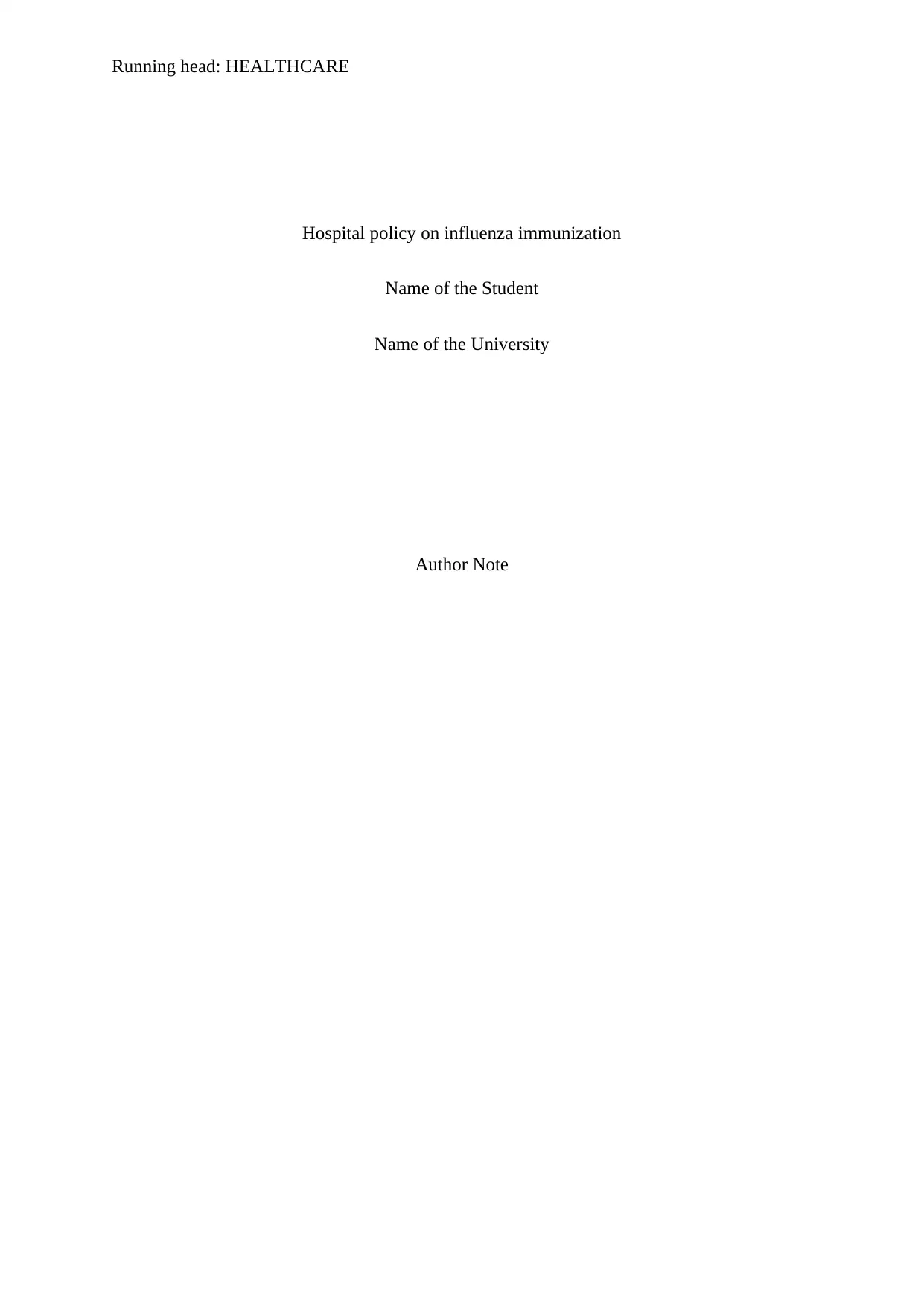
Running head: HEALTHCARE
Hospital policy on influenza immunization
Name of the Student
Name of the University
Author Note
Hospital policy on influenza immunization
Name of the Student
Name of the University
Author Note
Paraphrase This Document
Need a fresh take? Get an instant paraphrase of this document with our AI Paraphraser
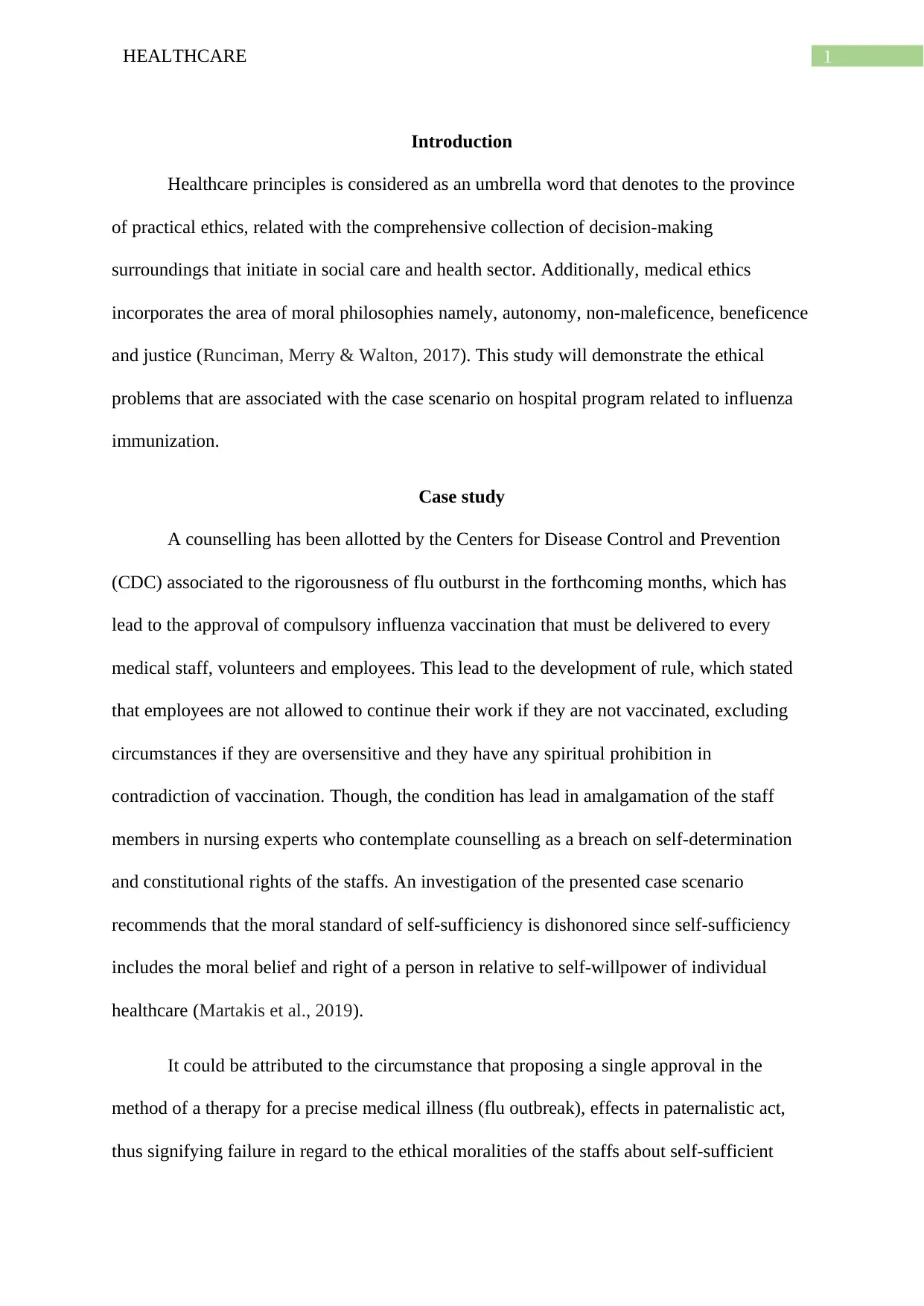
1HEALTHCARE
Introduction
Healthcare principles is considered as an umbrella word that denotes to the province
of practical ethics, related with the comprehensive collection of decision-making
surroundings that initiate in social care and health sector. Additionally, medical ethics
incorporates the area of moral philosophies namely, autonomy, non-maleficence, beneficence
and justice (Runciman, Merry & Walton, 2017). This study will demonstrate the ethical
problems that are associated with the case scenario on hospital program related to influenza
immunization.
Case study
A counselling has been allotted by the Centers for Disease Control and Prevention
(CDC) associated to the rigorousness of flu outburst in the forthcoming months, which has
lead to the approval of compulsory influenza vaccination that must be delivered to every
medical staff, volunteers and employees. This lead to the development of rule, which stated
that employees are not allowed to continue their work if they are not vaccinated, excluding
circumstances if they are oversensitive and they have any spiritual prohibition in
contradiction of vaccination. Though, the condition has lead in amalgamation of the staff
members in nursing experts who contemplate counselling as a breach on self-determination
and constitutional rights of the staffs. An investigation of the presented case scenario
recommends that the moral standard of self-sufficiency is dishonored since self-sufficiency
includes the moral belief and right of a person in relative to self-willpower of individual
healthcare (Martakis et al., 2019).
It could be attributed to the circumstance that proposing a single approval in the
method of a therapy for a precise medical illness (flu outbreak), effects in paternalistic act,
thus signifying failure in regard to the ethical moralities of the staffs about self-sufficient
Introduction
Healthcare principles is considered as an umbrella word that denotes to the province
of practical ethics, related with the comprehensive collection of decision-making
surroundings that initiate in social care and health sector. Additionally, medical ethics
incorporates the area of moral philosophies namely, autonomy, non-maleficence, beneficence
and justice (Runciman, Merry & Walton, 2017). This study will demonstrate the ethical
problems that are associated with the case scenario on hospital program related to influenza
immunization.
Case study
A counselling has been allotted by the Centers for Disease Control and Prevention
(CDC) associated to the rigorousness of flu outburst in the forthcoming months, which has
lead to the approval of compulsory influenza vaccination that must be delivered to every
medical staff, volunteers and employees. This lead to the development of rule, which stated
that employees are not allowed to continue their work if they are not vaccinated, excluding
circumstances if they are oversensitive and they have any spiritual prohibition in
contradiction of vaccination. Though, the condition has lead in amalgamation of the staff
members in nursing experts who contemplate counselling as a breach on self-determination
and constitutional rights of the staffs. An investigation of the presented case scenario
recommends that the moral standard of self-sufficiency is dishonored since self-sufficiency
includes the moral belief and right of a person in relative to self-willpower of individual
healthcare (Martakis et al., 2019).
It could be attributed to the circumstance that proposing a single approval in the
method of a therapy for a precise medical illness (flu outbreak), effects in paternalistic act,
thus signifying failure in regard to the ethical moralities of the staffs about self-sufficient
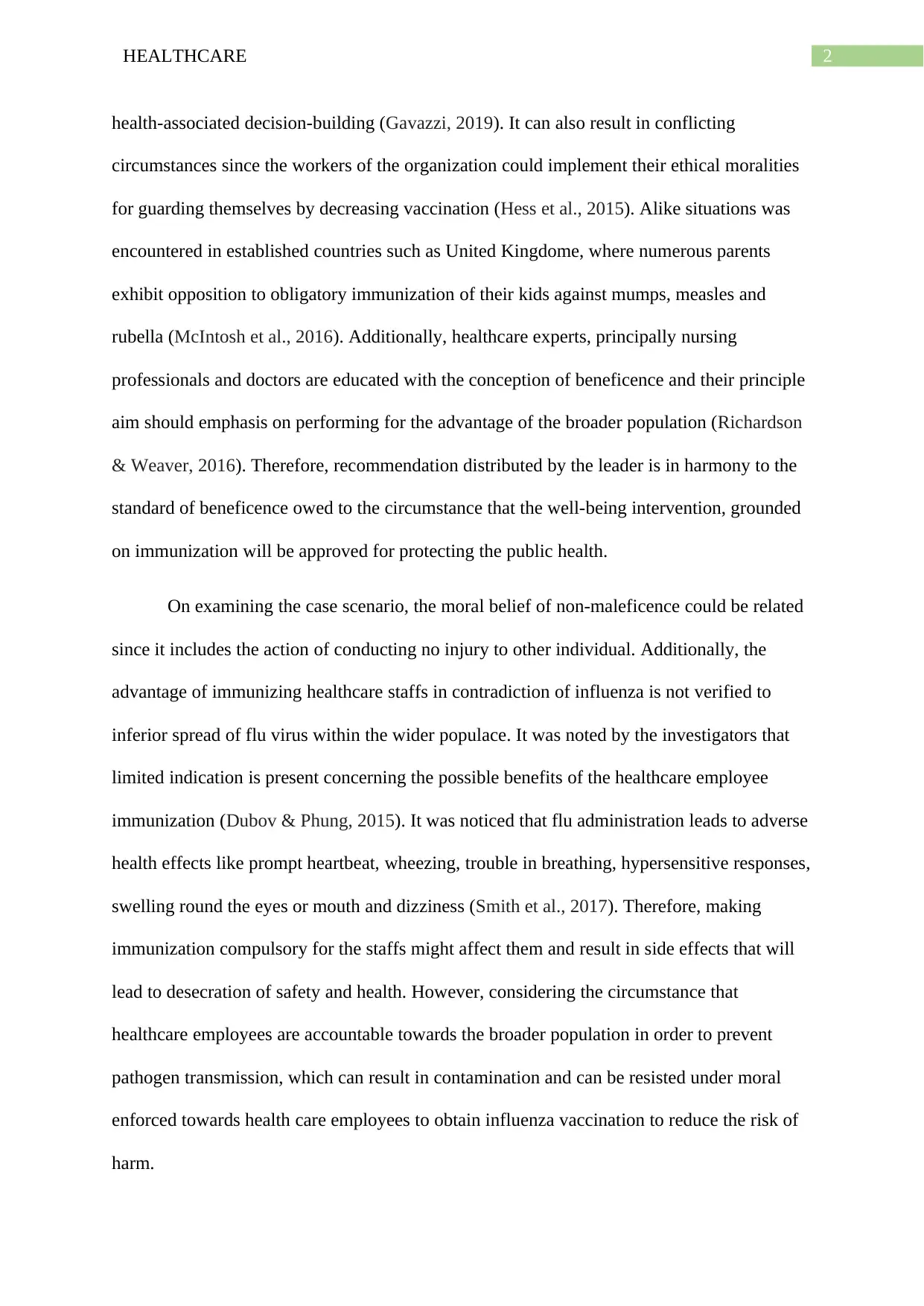
2HEALTHCARE
health-associated decision-building (Gavazzi, 2019). It can also result in conflicting
circumstances since the workers of the organization could implement their ethical moralities
for guarding themselves by decreasing vaccination (Hess et al., 2015). Alike situations was
encountered in established countries such as United Kingdome, where numerous parents
exhibit opposition to obligatory immunization of their kids against mumps, measles and
rubella (McIntosh et al., 2016). Additionally, healthcare experts, principally nursing
professionals and doctors are educated with the conception of beneficence and their principle
aim should emphasis on performing for the advantage of the broader population (Richardson
& Weaver, 2016). Therefore, recommendation distributed by the leader is in harmony to the
standard of beneficence owed to the circumstance that the well-being intervention, grounded
on immunization will be approved for protecting the public health.
On examining the case scenario, the moral belief of non-maleficence could be related
since it includes the action of conducting no injury to other individual. Additionally, the
advantage of immunizing healthcare staffs in contradiction of influenza is not verified to
inferior spread of flu virus within the wider populace. It was noted by the investigators that
limited indication is present concerning the possible benefits of the healthcare employee
immunization (Dubov & Phung, 2015). It was noticed that flu administration leads to adverse
health effects like prompt heartbeat, wheezing, trouble in breathing, hypersensitive responses,
swelling round the eyes or mouth and dizziness (Smith et al., 2017). Therefore, making
immunization compulsory for the staffs might affect them and result in side effects that will
lead to desecration of safety and health. However, considering the circumstance that
healthcare employees are accountable towards the broader population in order to prevent
pathogen transmission, which can result in contamination and can be resisted under moral
enforced towards health care employees to obtain influenza vaccination to reduce the risk of
harm.
health-associated decision-building (Gavazzi, 2019). It can also result in conflicting
circumstances since the workers of the organization could implement their ethical moralities
for guarding themselves by decreasing vaccination (Hess et al., 2015). Alike situations was
encountered in established countries such as United Kingdome, where numerous parents
exhibit opposition to obligatory immunization of their kids against mumps, measles and
rubella (McIntosh et al., 2016). Additionally, healthcare experts, principally nursing
professionals and doctors are educated with the conception of beneficence and their principle
aim should emphasis on performing for the advantage of the broader population (Richardson
& Weaver, 2016). Therefore, recommendation distributed by the leader is in harmony to the
standard of beneficence owed to the circumstance that the well-being intervention, grounded
on immunization will be approved for protecting the public health.
On examining the case scenario, the moral belief of non-maleficence could be related
since it includes the action of conducting no injury to other individual. Additionally, the
advantage of immunizing healthcare staffs in contradiction of influenza is not verified to
inferior spread of flu virus within the wider populace. It was noted by the investigators that
limited indication is present concerning the possible benefits of the healthcare employee
immunization (Dubov & Phung, 2015). It was noticed that flu administration leads to adverse
health effects like prompt heartbeat, wheezing, trouble in breathing, hypersensitive responses,
swelling round the eyes or mouth and dizziness (Smith et al., 2017). Therefore, making
immunization compulsory for the staffs might affect them and result in side effects that will
lead to desecration of safety and health. However, considering the circumstance that
healthcare employees are accountable towards the broader population in order to prevent
pathogen transmission, which can result in contamination and can be resisted under moral
enforced towards health care employees to obtain influenza vaccination to reduce the risk of
harm.
⊘ This is a preview!⊘
Do you want full access?
Subscribe today to unlock all pages.

Trusted by 1+ million students worldwide
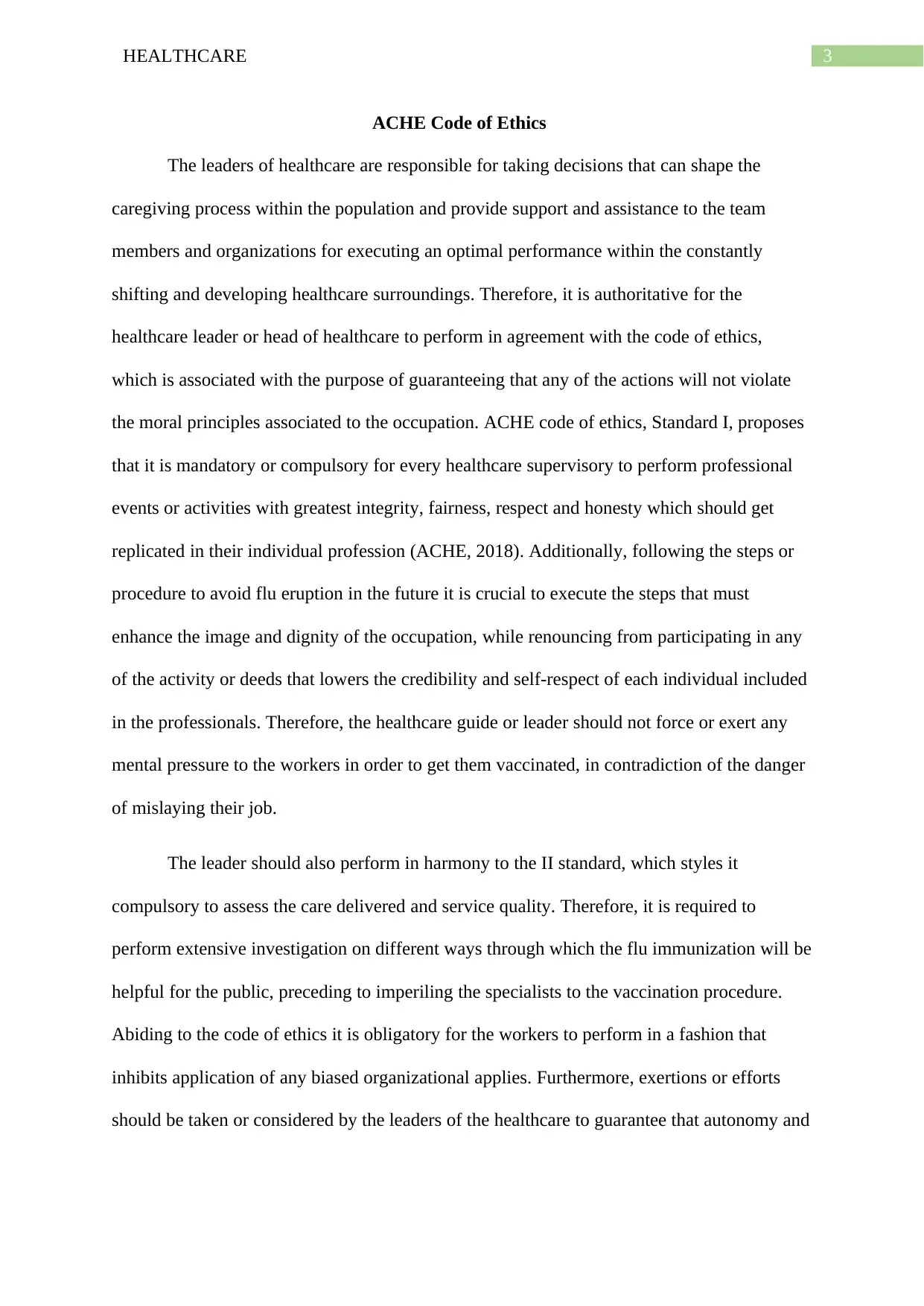
3HEALTHCARE
ACHE Code of Ethics
The leaders of healthcare are responsible for taking decisions that can shape the
caregiving process within the population and provide support and assistance to the team
members and organizations for executing an optimal performance within the constantly
shifting and developing healthcare surroundings. Therefore, it is authoritative for the
healthcare leader or head of healthcare to perform in agreement with the code of ethics,
which is associated with the purpose of guaranteeing that any of the actions will not violate
the moral principles associated to the occupation. ACHE code of ethics, Standard I, proposes
that it is mandatory or compulsory for every healthcare supervisory to perform professional
events or activities with greatest integrity, fairness, respect and honesty which should get
replicated in their individual profession (ACHE, 2018). Additionally, following the steps or
procedure to avoid flu eruption in the future it is crucial to execute the steps that must
enhance the image and dignity of the occupation, while renouncing from participating in any
of the activity or deeds that lowers the credibility and self-respect of each individual included
in the professionals. Therefore, the healthcare guide or leader should not force or exert any
mental pressure to the workers in order to get them vaccinated, in contradiction of the danger
of mislaying their job.
The leader should also perform in harmony to the II standard, which styles it
compulsory to assess the care delivered and service quality. Therefore, it is required to
perform extensive investigation on different ways through which the flu immunization will be
helpful for the public, preceding to imperiling the specialists to the vaccination procedure.
Abiding to the code of ethics it is obligatory for the workers to perform in a fashion that
inhibits application of any biased organizational applies. Furthermore, exertions or efforts
should be taken or considered by the leaders of the healthcare to guarantee that autonomy and
ACHE Code of Ethics
The leaders of healthcare are responsible for taking decisions that can shape the
caregiving process within the population and provide support and assistance to the team
members and organizations for executing an optimal performance within the constantly
shifting and developing healthcare surroundings. Therefore, it is authoritative for the
healthcare leader or head of healthcare to perform in agreement with the code of ethics,
which is associated with the purpose of guaranteeing that any of the actions will not violate
the moral principles associated to the occupation. ACHE code of ethics, Standard I, proposes
that it is mandatory or compulsory for every healthcare supervisory to perform professional
events or activities with greatest integrity, fairness, respect and honesty which should get
replicated in their individual profession (ACHE, 2018). Additionally, following the steps or
procedure to avoid flu eruption in the future it is crucial to execute the steps that must
enhance the image and dignity of the occupation, while renouncing from participating in any
of the activity or deeds that lowers the credibility and self-respect of each individual included
in the professionals. Therefore, the healthcare guide or leader should not force or exert any
mental pressure to the workers in order to get them vaccinated, in contradiction of the danger
of mislaying their job.
The leader should also perform in harmony to the II standard, which styles it
compulsory to assess the care delivered and service quality. Therefore, it is required to
perform extensive investigation on different ways through which the flu immunization will be
helpful for the public, preceding to imperiling the specialists to the vaccination procedure.
Abiding to the code of ethics it is obligatory for the workers to perform in a fashion that
inhibits application of any biased organizational applies. Furthermore, exertions or efforts
should be taken or considered by the leaders of the healthcare to guarantee that autonomy and
Paraphrase This Document
Need a fresh take? Get an instant paraphrase of this document with our AI Paraphraser
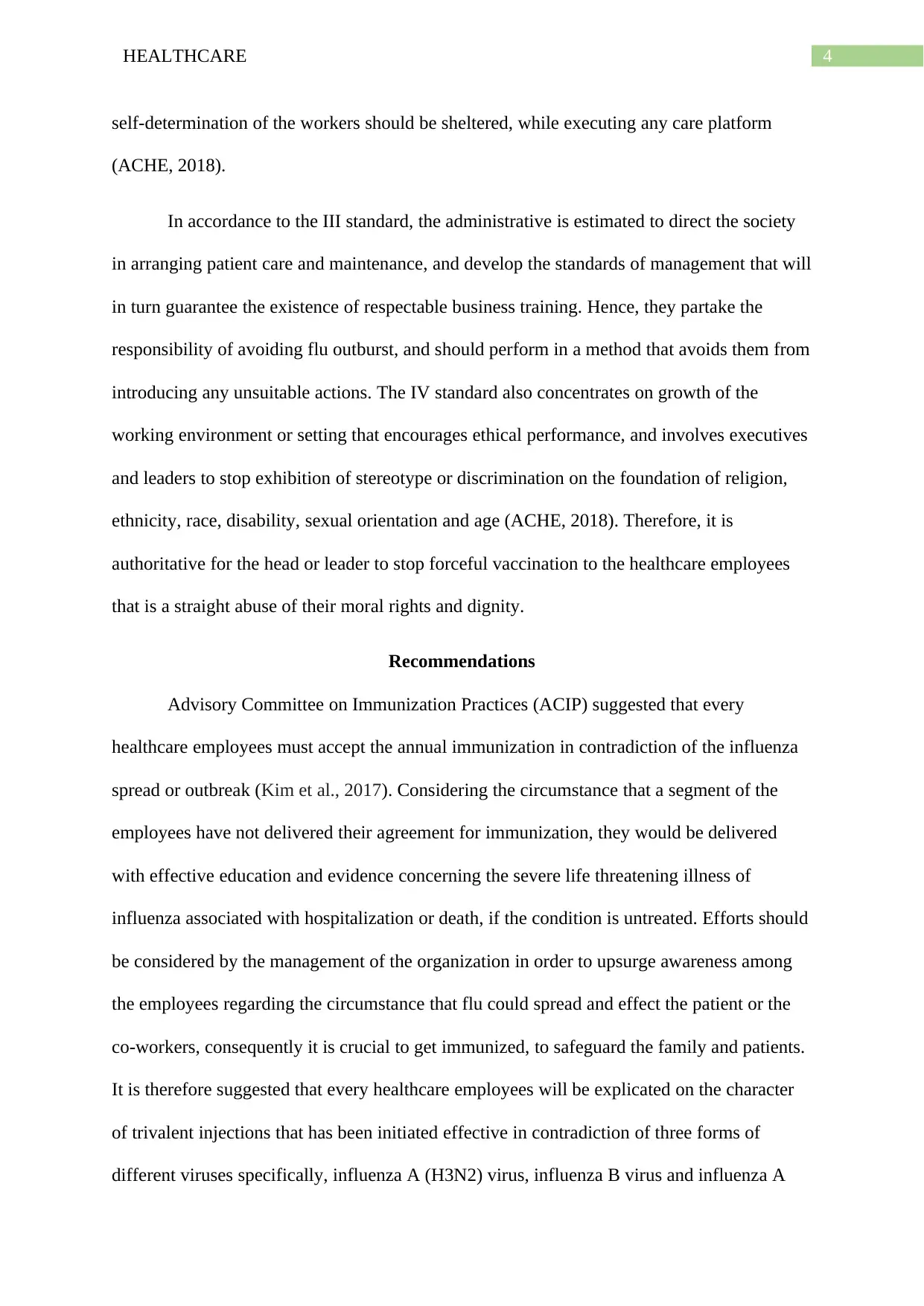
4HEALTHCARE
self-determination of the workers should be sheltered, while executing any care platform
(ACHE, 2018).
In accordance to the III standard, the administrative is estimated to direct the society
in arranging patient care and maintenance, and develop the standards of management that will
in turn guarantee the existence of respectable business training. Hence, they partake the
responsibility of avoiding flu outburst, and should perform in a method that avoids them from
introducing any unsuitable actions. The IV standard also concentrates on growth of the
working environment or setting that encourages ethical performance, and involves executives
and leaders to stop exhibition of stereotype or discrimination on the foundation of religion,
ethnicity, race, disability, sexual orientation and age (ACHE, 2018). Therefore, it is
authoritative for the head or leader to stop forceful vaccination to the healthcare employees
that is a straight abuse of their moral rights and dignity.
Recommendations
Advisory Committee on Immunization Practices (ACIP) suggested that every
healthcare employees must accept the annual immunization in contradiction of the influenza
spread or outbreak (Kim et al., 2017). Considering the circumstance that a segment of the
employees have not delivered their agreement for immunization, they would be delivered
with effective education and evidence concerning the severe life threatening illness of
influenza associated with hospitalization or death, if the condition is untreated. Efforts should
be considered by the management of the organization in order to upsurge awareness among
the employees regarding the circumstance that flu could spread and effect the patient or the
co-workers, consequently it is crucial to get immunized, to safeguard the family and patients.
It is therefore suggested that every healthcare employees will be explicated on the character
of trivalent injections that has been initiated effective in contradiction of three forms of
different viruses specifically, influenza A (H3N2) virus, influenza B virus and influenza A
self-determination of the workers should be sheltered, while executing any care platform
(ACHE, 2018).
In accordance to the III standard, the administrative is estimated to direct the society
in arranging patient care and maintenance, and develop the standards of management that will
in turn guarantee the existence of respectable business training. Hence, they partake the
responsibility of avoiding flu outburst, and should perform in a method that avoids them from
introducing any unsuitable actions. The IV standard also concentrates on growth of the
working environment or setting that encourages ethical performance, and involves executives
and leaders to stop exhibition of stereotype or discrimination on the foundation of religion,
ethnicity, race, disability, sexual orientation and age (ACHE, 2018). Therefore, it is
authoritative for the head or leader to stop forceful vaccination to the healthcare employees
that is a straight abuse of their moral rights and dignity.
Recommendations
Advisory Committee on Immunization Practices (ACIP) suggested that every
healthcare employees must accept the annual immunization in contradiction of the influenza
spread or outbreak (Kim et al., 2017). Considering the circumstance that a segment of the
employees have not delivered their agreement for immunization, they would be delivered
with effective education and evidence concerning the severe life threatening illness of
influenza associated with hospitalization or death, if the condition is untreated. Efforts should
be considered by the management of the organization in order to upsurge awareness among
the employees regarding the circumstance that flu could spread and effect the patient or the
co-workers, consequently it is crucial to get immunized, to safeguard the family and patients.
It is therefore suggested that every healthcare employees will be explicated on the character
of trivalent injections that has been initiated effective in contradiction of three forms of
different viruses specifically, influenza A (H3N2) virus, influenza B virus and influenza A
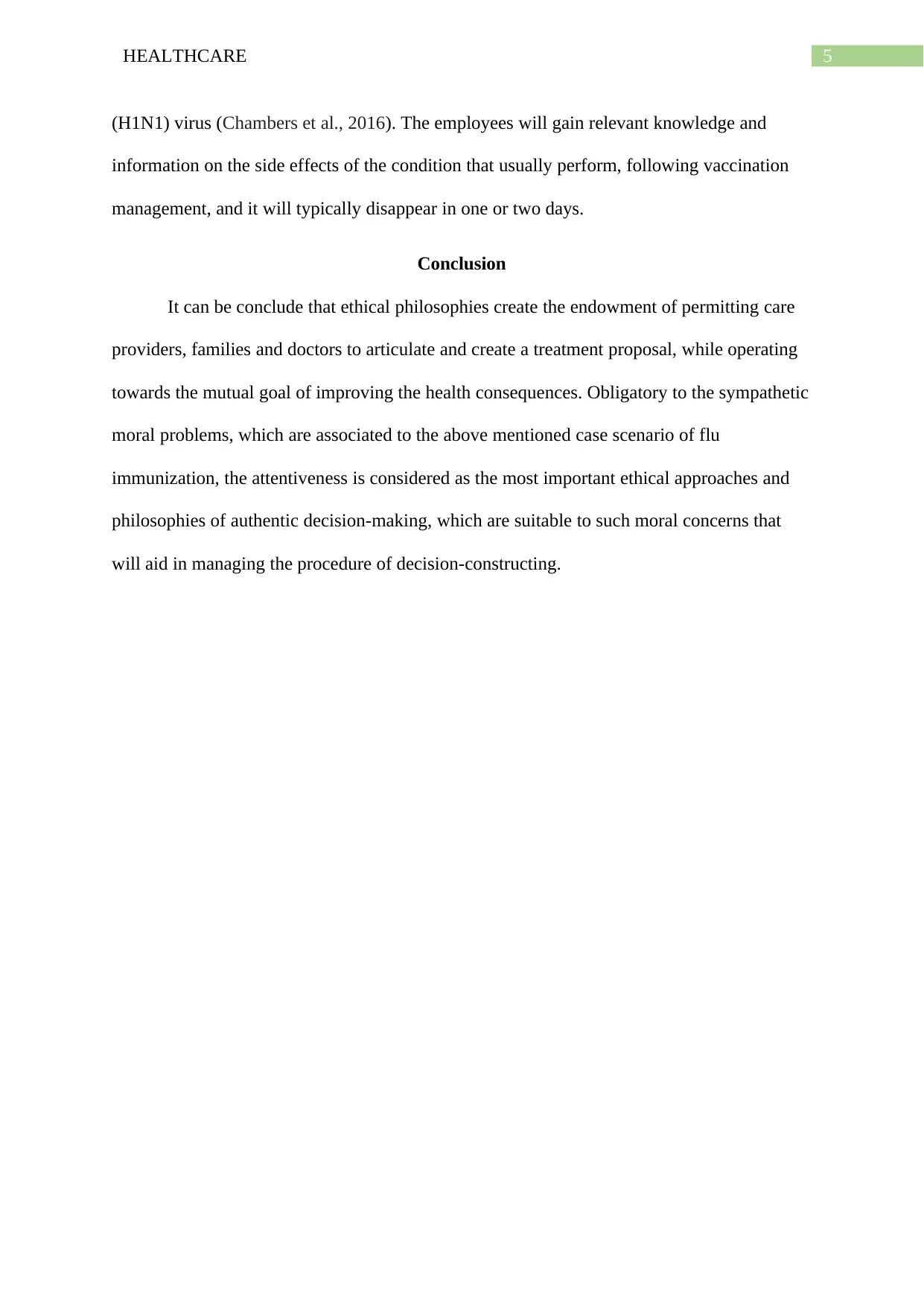
5HEALTHCARE
(H1N1) virus (Chambers et al., 2016). The employees will gain relevant knowledge and
information on the side effects of the condition that usually perform, following vaccination
management, and it will typically disappear in one or two days.
Conclusion
It can be conclude that ethical philosophies create the endowment of permitting care
providers, families and doctors to articulate and create a treatment proposal, while operating
towards the mutual goal of improving the health consequences. Obligatory to the sympathetic
moral problems, which are associated to the above mentioned case scenario of flu
immunization, the attentiveness is considered as the most important ethical approaches and
philosophies of authentic decision-making, which are suitable to such moral concerns that
will aid in managing the procedure of decision-constructing.
(H1N1) virus (Chambers et al., 2016). The employees will gain relevant knowledge and
information on the side effects of the condition that usually perform, following vaccination
management, and it will typically disappear in one or two days.
Conclusion
It can be conclude that ethical philosophies create the endowment of permitting care
providers, families and doctors to articulate and create a treatment proposal, while operating
towards the mutual goal of improving the health consequences. Obligatory to the sympathetic
moral problems, which are associated to the above mentioned case scenario of flu
immunization, the attentiveness is considered as the most important ethical approaches and
philosophies of authentic decision-making, which are suitable to such moral concerns that
will aid in managing the procedure of decision-constructing.
⊘ This is a preview!⊘
Do you want full access?
Subscribe today to unlock all pages.

Trusted by 1+ million students worldwide
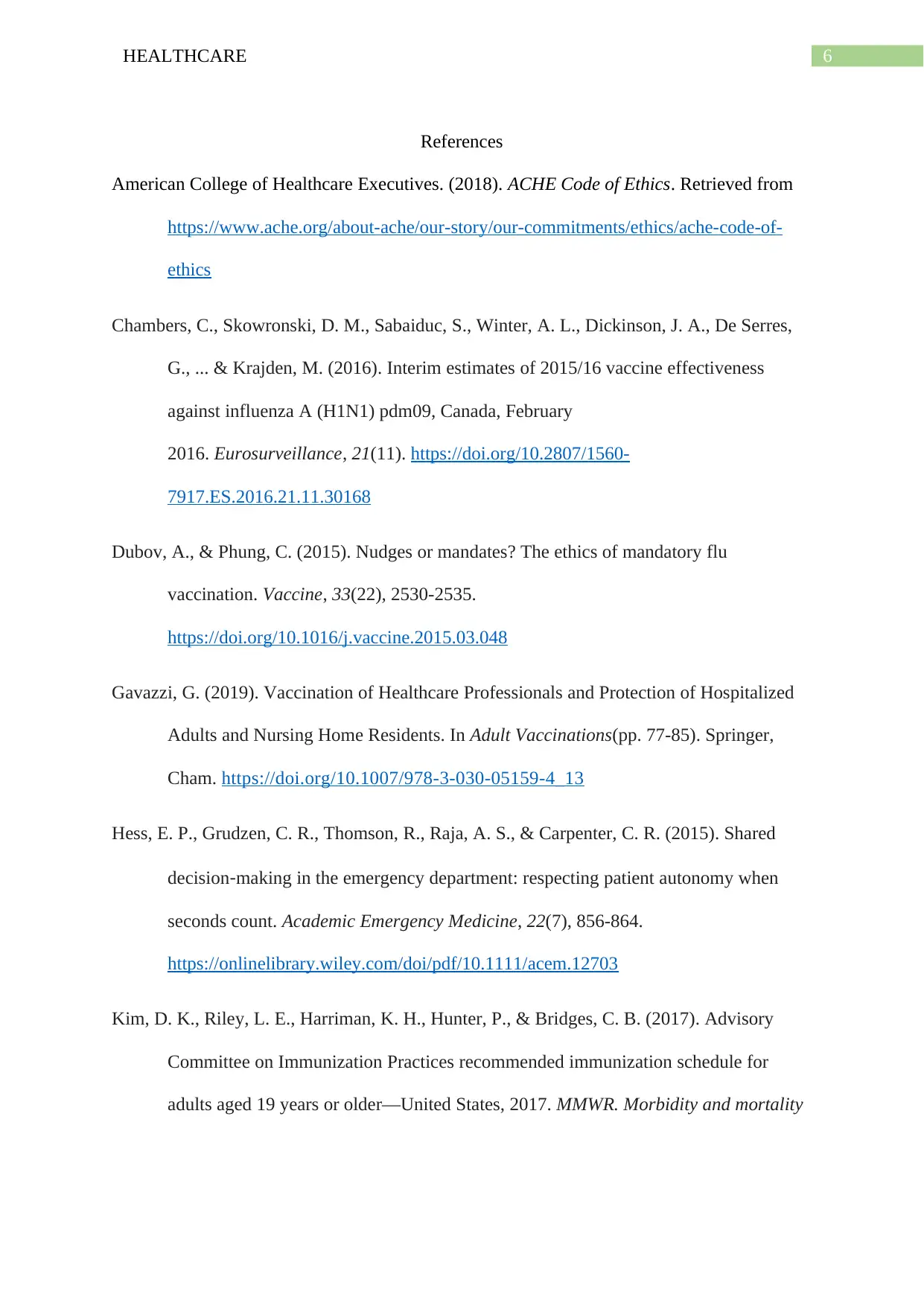
6HEALTHCARE
References
American College of Healthcare Executives. (2018). ACHE Code of Ethics. Retrieved from
https://www.ache.org/about-ache/our-story/our-commitments/ethics/ache-code-of-
ethics
Chambers, C., Skowronski, D. M., Sabaiduc, S., Winter, A. L., Dickinson, J. A., De Serres,
G., ... & Krajden, M. (2016). Interim estimates of 2015/16 vaccine effectiveness
against influenza A (H1N1) pdm09, Canada, February
2016. Eurosurveillance, 21(11). https://doi.org/10.2807/1560-
7917.ES.2016.21.11.30168
Dubov, A., & Phung, C. (2015). Nudges or mandates? The ethics of mandatory flu
vaccination. Vaccine, 33(22), 2530-2535.
https://doi.org/10.1016/j.vaccine.2015.03.048
Gavazzi, G. (2019). Vaccination of Healthcare Professionals and Protection of Hospitalized
Adults and Nursing Home Residents. In Adult Vaccinations(pp. 77-85). Springer,
Cham. https://doi.org/10.1007/978-3-030-05159-4_13
Hess, E. P., Grudzen, C. R., Thomson, R., Raja, A. S., & Carpenter, C. R. (2015). Shared
decision‐making in the emergency department: respecting patient autonomy when
seconds count. Academic Emergency Medicine, 22(7), 856-864.
https://onlinelibrary.wiley.com/doi/pdf/10.1111/acem.12703
Kim, D. K., Riley, L. E., Harriman, K. H., Hunter, P., & Bridges, C. B. (2017). Advisory
Committee on Immunization Practices recommended immunization schedule for
adults aged 19 years or older—United States, 2017. MMWR. Morbidity and mortality
References
American College of Healthcare Executives. (2018). ACHE Code of Ethics. Retrieved from
https://www.ache.org/about-ache/our-story/our-commitments/ethics/ache-code-of-
ethics
Chambers, C., Skowronski, D. M., Sabaiduc, S., Winter, A. L., Dickinson, J. A., De Serres,
G., ... & Krajden, M. (2016). Interim estimates of 2015/16 vaccine effectiveness
against influenza A (H1N1) pdm09, Canada, February
2016. Eurosurveillance, 21(11). https://doi.org/10.2807/1560-
7917.ES.2016.21.11.30168
Dubov, A., & Phung, C. (2015). Nudges or mandates? The ethics of mandatory flu
vaccination. Vaccine, 33(22), 2530-2535.
https://doi.org/10.1016/j.vaccine.2015.03.048
Gavazzi, G. (2019). Vaccination of Healthcare Professionals and Protection of Hospitalized
Adults and Nursing Home Residents. In Adult Vaccinations(pp. 77-85). Springer,
Cham. https://doi.org/10.1007/978-3-030-05159-4_13
Hess, E. P., Grudzen, C. R., Thomson, R., Raja, A. S., & Carpenter, C. R. (2015). Shared
decision‐making in the emergency department: respecting patient autonomy when
seconds count. Academic Emergency Medicine, 22(7), 856-864.
https://onlinelibrary.wiley.com/doi/pdf/10.1111/acem.12703
Kim, D. K., Riley, L. E., Harriman, K. H., Hunter, P., & Bridges, C. B. (2017). Advisory
Committee on Immunization Practices recommended immunization schedule for
adults aged 19 years or older—United States, 2017. MMWR. Morbidity and mortality
Paraphrase This Document
Need a fresh take? Get an instant paraphrase of this document with our AI Paraphraser
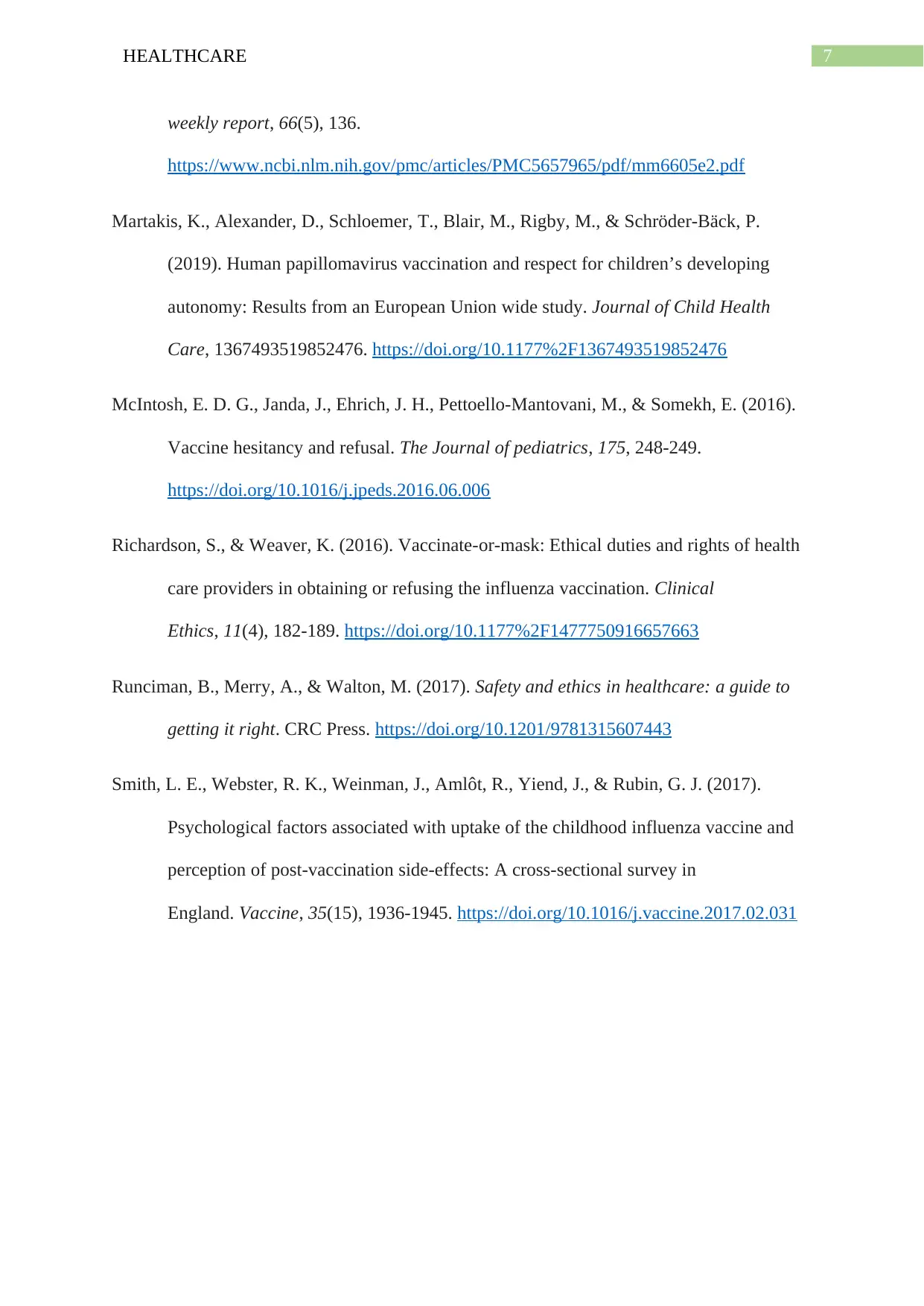
7HEALTHCARE
weekly report, 66(5), 136.
https://www.ncbi.nlm.nih.gov/pmc/articles/PMC5657965/pdf/mm6605e2.pdf
Martakis, K., Alexander, D., Schloemer, T., Blair, M., Rigby, M., & Schröder-Bäck, P.
(2019). Human papillomavirus vaccination and respect for children’s developing
autonomy: Results from an European Union wide study. Journal of Child Health
Care, 1367493519852476. https://doi.org/10.1177%2F1367493519852476
McIntosh, E. D. G., Janda, J., Ehrich, J. H., Pettoello-Mantovani, M., & Somekh, E. (2016).
Vaccine hesitancy and refusal. The Journal of pediatrics, 175, 248-249.
https://doi.org/10.1016/j.jpeds.2016.06.006
Richardson, S., & Weaver, K. (2016). Vaccinate-or-mask: Ethical duties and rights of health
care providers in obtaining or refusing the influenza vaccination. Clinical
Ethics, 11(4), 182-189. https://doi.org/10.1177%2F1477750916657663
Runciman, B., Merry, A., & Walton, M. (2017). Safety and ethics in healthcare: a guide to
getting it right. CRC Press. https://doi.org/10.1201/9781315607443
Smith, L. E., Webster, R. K., Weinman, J., Amlôt, R., Yiend, J., & Rubin, G. J. (2017).
Psychological factors associated with uptake of the childhood influenza vaccine and
perception of post-vaccination side-effects: A cross-sectional survey in
England. Vaccine, 35(15), 1936-1945. https://doi.org/10.1016/j.vaccine.2017.02.031
weekly report, 66(5), 136.
https://www.ncbi.nlm.nih.gov/pmc/articles/PMC5657965/pdf/mm6605e2.pdf
Martakis, K., Alexander, D., Schloemer, T., Blair, M., Rigby, M., & Schröder-Bäck, P.
(2019). Human papillomavirus vaccination and respect for children’s developing
autonomy: Results from an European Union wide study. Journal of Child Health
Care, 1367493519852476. https://doi.org/10.1177%2F1367493519852476
McIntosh, E. D. G., Janda, J., Ehrich, J. H., Pettoello-Mantovani, M., & Somekh, E. (2016).
Vaccine hesitancy and refusal. The Journal of pediatrics, 175, 248-249.
https://doi.org/10.1016/j.jpeds.2016.06.006
Richardson, S., & Weaver, K. (2016). Vaccinate-or-mask: Ethical duties and rights of health
care providers in obtaining or refusing the influenza vaccination. Clinical
Ethics, 11(4), 182-189. https://doi.org/10.1177%2F1477750916657663
Runciman, B., Merry, A., & Walton, M. (2017). Safety and ethics in healthcare: a guide to
getting it right. CRC Press. https://doi.org/10.1201/9781315607443
Smith, L. E., Webster, R. K., Weinman, J., Amlôt, R., Yiend, J., & Rubin, G. J. (2017).
Psychological factors associated with uptake of the childhood influenza vaccine and
perception of post-vaccination side-effects: A cross-sectional survey in
England. Vaccine, 35(15), 1936-1945. https://doi.org/10.1016/j.vaccine.2017.02.031
1 out of 8
Related Documents
Your All-in-One AI-Powered Toolkit for Academic Success.
+13062052269
info@desklib.com
Available 24*7 on WhatsApp / Email
![[object Object]](/_next/static/media/star-bottom.7253800d.svg)
Unlock your academic potential
Copyright © 2020–2026 A2Z Services. All Rights Reserved. Developed and managed by ZUCOL.



